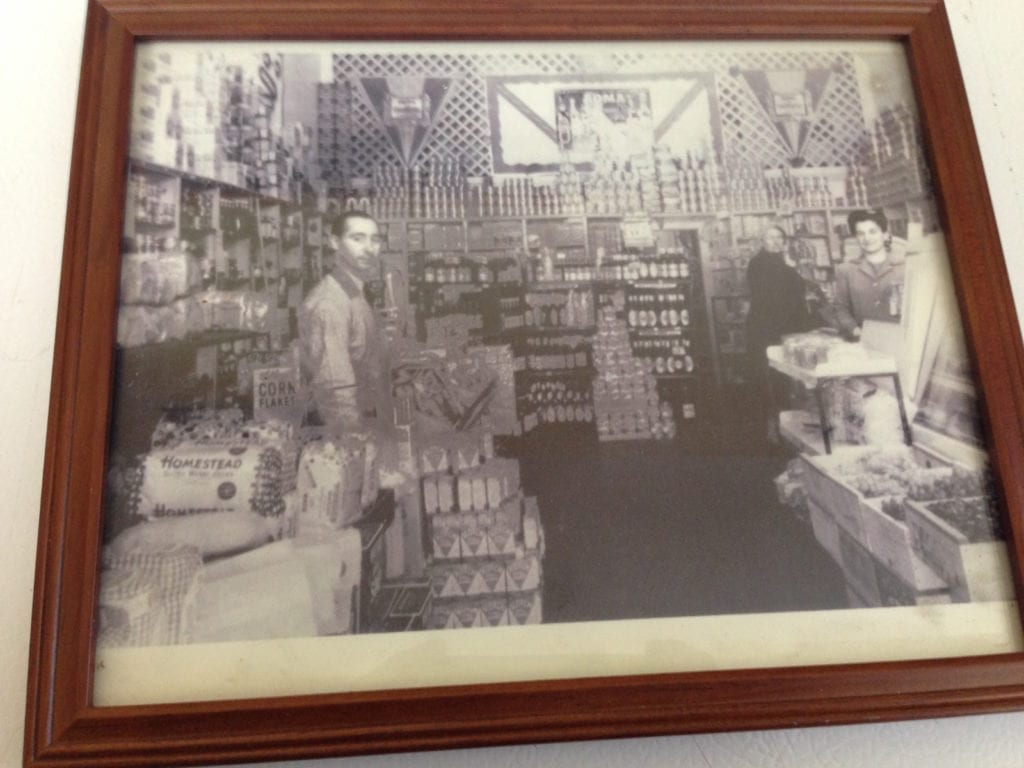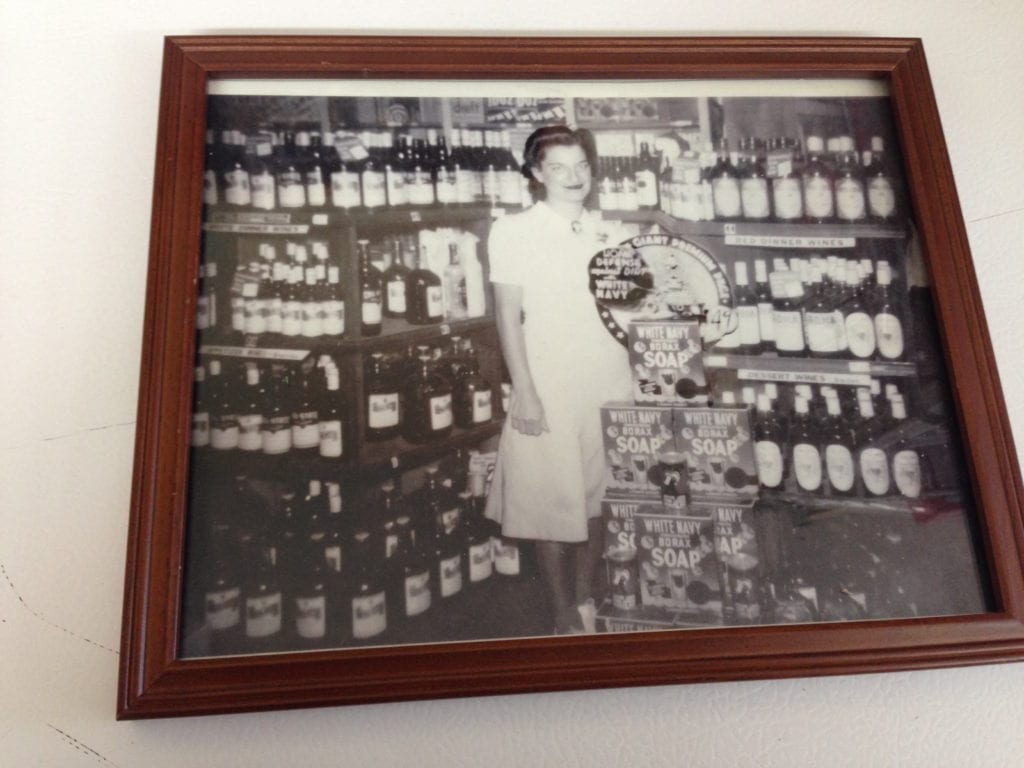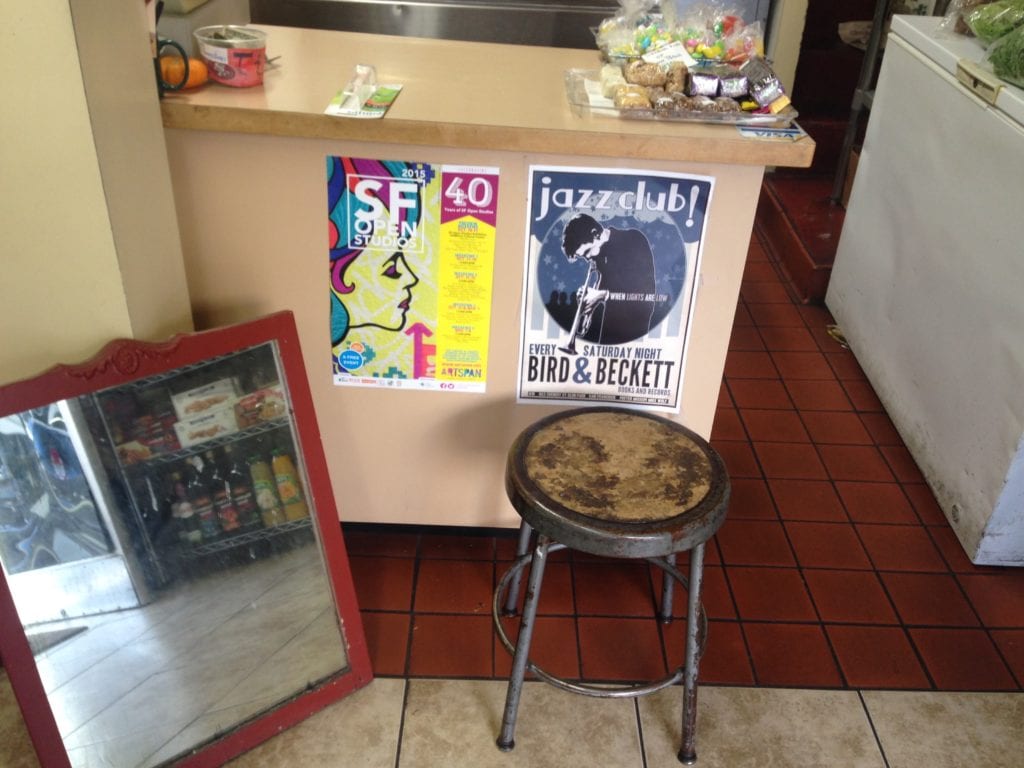
Story and photos by Murray Schneider
Every neighborhood once had such a place, a safe place — the corner pharmacy, a five and dime, a dry cleaner, a diner.
From the 1930s through the early 1990s, Constantine and Rose Portale’s Chenery Street Groceteria served Glen Park families as such a sanctuary.
“Connie and Rose represented a different age,” said Emily Bratt. Emily sat on a sofa in her Arbor Street living room, reading a letter written by her late sister-in-law Anna Bratt, who lived on Noe Street just as it nudges against Laidley.

Holly Bratt, her daughter, sat with her. The two women, part of the legendary Bratt clan, took turns studying the 1992 letter, which had come to their attention through the offices of the Glen Park Association.
Anna Bratt titled her missive “The Saga of the Glen Park Groceteria (1939-1992).
“Connie was our grocer, our friend and a psychiatrist for those who sat on a round stool in the grocery store and poured out their troubles,” wrote Anna Bratt, who passed away in 2013. “Connie assisted in mending our heads and hearts and he was also a financier of those short of cash and in need of groceries.”

“It’s true,” said Holly Bratt, as Willie Nelson, their French bulldog, burrowed beneath two couch pillows. “Connie and Rose’s store was open to everybody. There were two stools, Connie sat on the shorter and Rose on the taller one.”
Connie and Rose’s store occupied the space that now houses fitGlenfit, and before Rick and Nada Malouf moved to Marian Dalere’s smaller confines next door several years ago, the Malouf’s Cheese Boutique inaugurated its business where Connie had once served fiduciary advice as well as he sliced mortadella.
“Every neighborhood has its eccentrics,” said Holly Bratt. “After school, I’d hang out at the Groceteria. Connie always wore a green smock and slicked back his black hair with Brylcreem. He’d listened to anyone who came in the store.”
This was the early Sixties, a quarter century into the Groceteria’s Glen Park tenure.
“Anyhow, this guy Donald regularly showed up,” recalled Holly. “He was a little off, if you know what I mean. He’d buy beer and cigarettes, but he’d never pay. Connie put everything on the cuff, and at the end of the month Donald’s mother came in and settled up.”
“Connie was always doing that,” said Emily Bratt. “He carried people during the Depression. He’d let them run tabs.”
Tiffany Farr, who with her husband Paul owned Tiffany’s Wine and Spirits next to Connie’s store, recalls it this way.
“One time a boy comes into my shop and says, ‘my parents left the neighborhood without paying Connie,’” said Farr several days later. “So I told him this is your opportunity, go next door and pay up.”
“Then there was the ‘Foxy Lady,’ Holly said. “She had something to do with a lingerie store on Mission Street. She’d wander around the neighborhood shops, eventually ending up at Connie’s. She’d take her place on one of the stools and shoot the breeze for hours.”
“Connie, I would say,” wrote Anna Bratt, “we are having a party, a wedding, an anniversary, a baptism, a graduation and all those events in a family lifetime. How about four pounds of salami, four pounds of cheese, and how about slicing up the whole ham I bought. And Connie would say, ‘sure Ann, when do you want it?’”
“It’s true,” said Emily Bratt. “Connie would climb in his station wagon and make deliveries.”
Anna Bratt’s letter spelled it out even more clearly:
“Going back 35 or 40 years …….Connie, I would say on the telephone, I’m stuck in the house with all my children today. On the other end of the line comes the soft, gentle voice …..What do you need Ann? The next thing you know there was Connie at my door with my groceries.’”
Looking at fitGlenfit today, you’d never know it once housed what Holly Bratt remembers as a safe harbor where, after Glen Park Elementary’s last bell, she’d down one of Connie’s hoagies before she trekked up Diamond Street to her house.
“I was a latch key kid,” said Holly, “and Connie made the best hard roll salami sandwich. We kids called it Connie’s Sandwich.”
“He was also so generous to my carpenter husband, Tom,” added Emily, “lending him tools.”
While it would never be confused with Safeway, the Groceteria was a full service market, providing deli and meats, milk, juices, bread, canned goods and an ample supply of wine and spirits. Old timers still remember a bourbon labeled “Pride of Glen Park,” which Connie shelved next to fifths of Old Crow.
Connie’s business slowed down at the end, and when long-time customers trickled in they’d find Connie and Rose sitting together, listening to the radio. Connie stayed pretty close to his cash register and telephone, but Rose often ventured downtown on the 26-Valencia and shopped at the Emporium.
Connie suffered heart issues and finally passed, survived by Rose and their two sons. Rose celebrated her 90th birthday at Chenery Park, continuing to live in the family apartment above the grocery.
After Connie left her, Rose would descend the back stairs to the Cheese Boutique, sit on her stool that Rick Malouf keeps as a souvenir and watch him slice cheese.
“She’d tell me how much I reminded her of Connie,” said Malouf, reminiscing when recently shown Anna Bratt’s letter.
“Toward the end I’d walk upstairs and deliver Rose groceries just like Connie used to do with his customers,” said Malouf. “When Rose would come downstairs, she’d tip all the help, not just the girl who’d bagged her groceries.”
“She was nothing but good luck to me,” said Malouf, smiling.
Like Malouf, the Bratt ladies inherited a Groceteria keepsake.
“We suddenly found ourselves without a kitchen table,” Holly said, pointing to her Fifties-era Formica table. “Connie and Rose came to our rescue and gave it to us.”
As if on cue, Willie Nelson gained the Portale/Bratt table and posed.
Anna Bratt’s December 1992 letter concluded:
“This was the “Saga” of Connie —our dear friend. We love you Connie and as your customers, we give full support to your dear wonderful wife Rose and your son’s Jack and Emil and their families. May you rest in peace, and someday we shall meet again.”